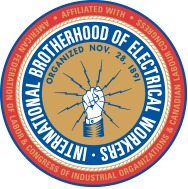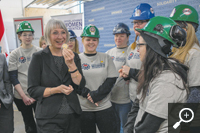Expanding programs for women who might be considering a career in the skilled construction trades, or who are already in them, is the goal of a new joint initiative of Canada’s Building Trades Unions and the federal government.
“For years, women have steadily made up about 4 percent of the IBEW’s membership in Canada,” said First District International Vice President Tom Reid, who also is a member of CBTU’s executive board. “That number should be growing, but despite advances in attitudes, women still face challenges on the job site.”
During a Feb. 21 event at Winnipeg, Manitoba, Local 2085, CBTU Operating Officer Robert Blakely joined Canadian Minister of Employment, Workforce Development and Labour Patty Hajdu to announce that more than $3 million per year over the next three years has been earmarked by the federal government to fund Office to Advance Women Apprentices locations in Manitoba and Saskatchewan, plus one in Nova Scotia that also will cover New Brunswick and Prince Edward Island.
“The skilled trades are facing a shortage of workers,” said Blakely, who retired in March. “We want to build careers for Canadians, not just short-term jobs.”
In 2009, Canada’s first OAWA location was created and funded by the provincial government of Newfoundland and Labrador, where women now make up nearly 13 percent of the building trades workforce. In conjunction with unions, employers, governments and training sites, the OAWA’s mission is to help women apprentices find and retain post-apprenticeship work.
The three new OAWA offices will help up to 750 women apprentices finish their training and get Red Seal certifications that will allow them to work in every part of Canada. The $3 million in new funding is in addition to the $25 million a year that Canada already spends to train apprentices under the country’s Union Training and Innovation Program.
“Building a diverse and inclusive workforce is not only the right thing to do, it’s the smart thing to do for Canada’s future,” Hajdu said. “A strong middle class depends on a job market where all people, regardless of gender, have a real and fair chance at success.”
Included in OAWA’s offerings are career services, employment support and networking opportunities. The program also will develop and maintain a database to help track such things as apprenticeship numbers and completion rates.
“We will have measurable outcomes that will impact not only the construction industry, but the lives of those women that enter the trades, earn their Red Seal certification and pursue a lifelong career of learning in a challenging industry, with wages and benefits to support their families,” said CBTU Director of Workforce Development Lindsay Amundsen.
The new initiative also means that employers, unions and training providers, while working together to improve the participation of women, also will benefit from diversity, discrimination and harassment training as part of a commitment to making a career in the skilled trades open for everyone.
Meanwhile, the IBEW remains increasingly committed to recruiting and retaining women for what are good, well paying, middle-class jobs, Reid said.
“We’ve been doing a better job of attracting women to the trades and getting them into the IBEW, but when they are driven away by harassment or abuse, they understandably don’t come back,” Reid said.
To help fight such problems, he said, many IBEW locals are forming women’s committees, providing more opportunities for women to come together in safe spaces where they can talk about specific, important issues.
“It is my desire that the IBEW in Canada double down our efforts to attract and retain more female members, and that can only happen with the positive support and recognition that we as an organization can provide to our current female members,” Reid said.
The three new OAWA offices should help expand IBEW’s own efforts as well as the ongoing work of CBTU’s Women of the Building Trades program, part of that organization’s Build Together project that focuses on the recruitment and retention of working people from typically underrepresented population groups.
Additionally, Canada recently began offering an apprenticeship incentive grant for eligible registered female apprentices. Those interested can learn more at canada.ca/apprenticeship-grants.




